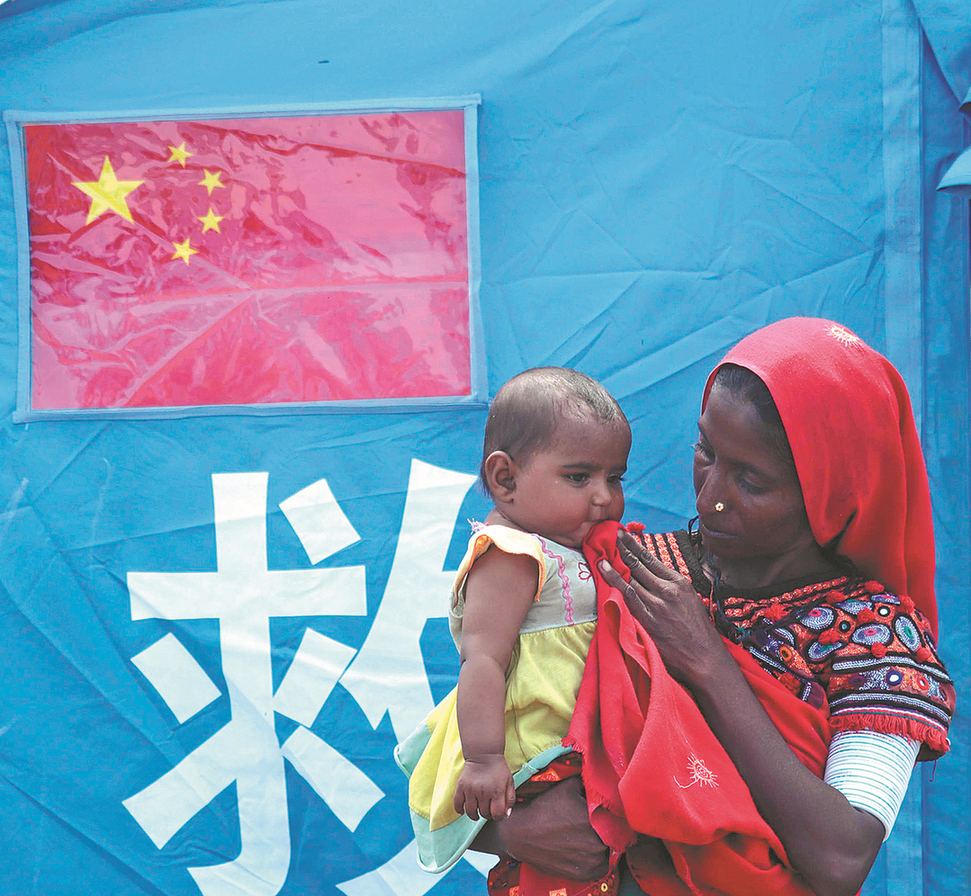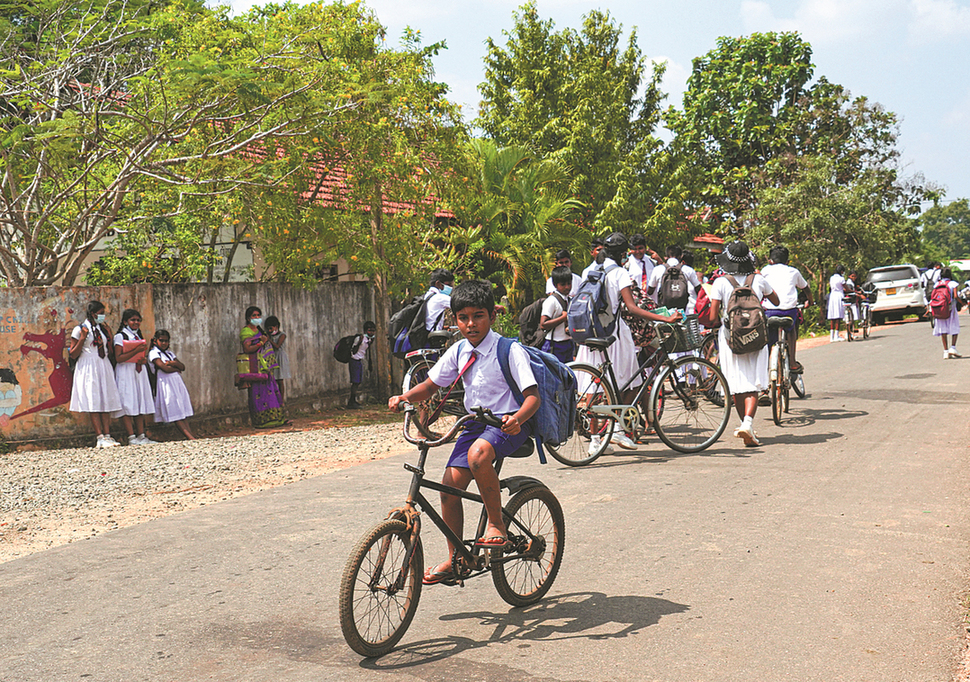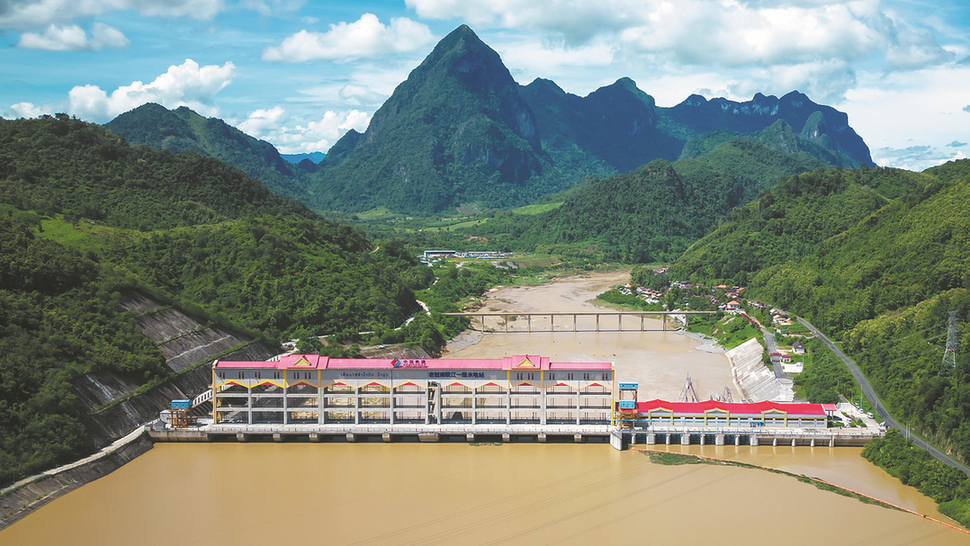


Padma Bridge in Bangladesh, built by a Chinese company, is opened for use on June 25. The bridge is expected to contribute 1.23 percentage points to Bangladesh's GDP growth and reduce poverty by 0.84 percentage points per year, Bangladesh Prime Minister Sheikh Hasina said. XINHUA
China-proposed security framework could fend off conflict, US 'meddling', experts say
The China-proposed Global Security Initiative has huge potential as a bulwark against conflict and as a promoter of peace and stability in Asia, experts said.
"The future of the Global Security Initiative… has huge potential, and I think it will gain traction in a matter of time because it is very pragmatic," said Anna Malindog-Uy, vice-president for external affairs at the Asian Century Philippines Strategic Studies Institute.
Given that the world is facing a volatile and challenging geopolitical order, Malindog-Uy said the GSI will serve to provide guardrails against instability and conflict.
"I think that is a good prescription if you want to pursue peace, stability and development in Asia and beyond," she said.
The GSI was proposed by President Xi Jinping in April at the Boao Forum for Asia Annual Conference 2022 in Hainan province.
It puts forth six commitments for countries to consider: the vision of common, comprehensive, cooperative and sustainable security for all countries; respecting the sovereignty and territorial integrity of all countries; adhering to the purposes and principles of the United Nations Charter; the legitimate security concerns of all countries; resolving differences and dispute through dialogue and consultation; and maintaining security in both traditional and nontraditional domains to shoulder the responsibility for maintaining peace.
In the report to the 20th CPC National Congress, Xi Jinping announced that building a community with a shared future for mankind is the way forward for all the world's people. China has put forward the Global Development Initiative and the Global Security Initiative, and the country stands ready to work with the international community to put these two initiatives into action, he said.
There are many serious security challenges in Asia, including tensions in the Korean Peninsula and along the borders between India, China and Pakistan, as well as turmoil in Myanmar and conflicts in the Middle East, said Henry Chan, a visiting senior research fellow at the Cambodian Institute for Cooperation and Peace.
"Being the largest country in the region and the dominant economic and military power as well, the Chinese commitment to the peaceful resolution of dispute provides the necessary anchor to regional peace," Chan said.
With dialogue being the vital first step to resolving conflict, he said that China can play the role of dialogue initiator in terms of regional security.
Chan said the GSI's commitments largely resonate with the core principles of the 1955 Bandung Conference on the mutual respect of sovereignty, nonaggression, noninterference in internal affairs, and equality.
"China's consistency in abiding by the Bandung Spirit in its international relationships is reassurance that it will not be a hegemon and will treat others on equal footing," Chan said.
Ong Tee Keat, chairman of the Kuala Lumpur-based think tank, Centre for New Inclusive Asia, said the notion of the GSI is rooted in the principle of "indivisible security", underscoring that no country can strengthen its own security at the expense of others.

A flood victim holding her child stands in front of a tent funded by China at a temporary camp in Sindh province, Pakistan, on Sept 29,2019. XINHUA
US 'intrusiveness'
Noting that the initiative calls for a common, comprehensive, cooperative and sustainable security model of mutual respect, openness and integration, Ong said this is particularly the case for members of the Association of Southeast Asian Nations, as well as East Asia following intensified moves by the United States to drive a wedge between China and its neighbors in the region.
For example, the US has engaged in saber-rattling by deploying warships in disputed zones under the pretext of "freedom of navigation operations", purportedly upholding the rights, freedom and lawful use of the sea, Ong said.
He also said the US has ramped up efforts to create a de facto Asian NATO, "following the activation of the QUAD and the inception of AUKUS, which could contribute to escalating security threats and make existing challenges more intractable".
He was referring to the Quadrilateral Security Dialogue between Australia, Japan, India and the US, and the trilateral defense partnership between the US, the United Kingdom and Australia.
Talat Shabbir, director of the China-Pakistan Study Centre at the Institute of Strategic Studies in Islamabad, said the GSI is sorely needed.
"It was obvious as the international arena echoes with unprecedented disorder after the US retreated from its global responsibilities," he said, noting that the GSI can be contextualized with the world having been embroiled in crisis after crisis for the past two decades.
In particular, he said a "new Great Game" is at its peak in Asia as the region has become an arena for the great powers, and there are many border clashes going on.
"Amid these security challenges, the six commitments of the GSI are a welcome step," Shabbir said, adding that he wants to see more concrete plans to implement the initiative.

Students ride along a village road built by a Chinese company in Vavuniya, Sri Lanka, in March. TANG LU/XINHUA
Support in Asia
Governments of Asian countries have spoken out for peace, security and development cooperation.
During the 77th session of the United Nations General Assembly in New York on Sept 24, Laotian Deputy Prime Minister and Foreign Minister Saleumxay Kommasith, said the international community needs to find peaceful and lasting solutions to conflicts and disputes to promote multilateralism and shared interests of all countries.
In a position paper to the assembly, China also said that the international community's call for peace and development has grown stronger.
"Countries need to strengthen solidarity and cooperation, uphold the vision of 'a community with a shared future for mankind', improve the global governance system, and work together to find solutions to global issues," it said, noting the importance of true multilateralism and a global community of security for all.
Lucio Blanco Pitlo III, a research fellow at the Philippine think tank Asia Pacific Pathways to Progress, said the GSI supports dialogue and consultation with all parties to a dispute, ensuring that their interests and concerns are heard.
"Its emphasis on noninterference will soothe countries of various political and governance stripes wary of external forces intruding into their domestic affairs," said Pitlo, noting this is a welcome relief for countries that have long suffered from foreign intervention.
Pitlo also said the GSI puts a premium on UN-led efforts to provide more credible cover for international mediation, peacekeeping and relief missions.
However, "disagreement between key members can stymie UN work and diminish its role in brewing hot spots, if not actual conflict zones", Pitlo said.
Mustafa Izzuddin, senior international affairs analyst at consultancy firm Solaris Strategies Singapore, said he sees the GSI more as an opportunity for countries in the Asia-Pacific region to pursue direct engagement with China.
"The more the GSI seeks to include, rather than exclude, the more it may find resonance with countries in the Asia-Pacific," he said, adding that the more the region is perceived to be secure, the more economic development and even progressive integration of diverse economies there will be.
"Without a robust security architecture, there will be ebbs and flows in economic development, so it is incumbent on countries in the Asia-Pacific to look for ways to enhance regional security," Mustafa Izzuddin said.
He noted that Western colonization has left an indelible mark in the region, for better and for worse, including giving rise to present-day border disputes.
"Countries should not escalate but de-escalate border conflicts and come to the realization that it is better to cooperate on security matters and understand that their mutual interests are not confined to border disputes," he said.

A Chinese-invested hydropower station in Laos has generated more than 10 billion kilowatt-hours of electricity by July 12. KAI QIAO/XINHUA
Cambodia cooperation
The GSI will not replace the UN-based Security Council but serve as a complementary security watchdog that will adhere to the principle of peaceful coexistence and China's vision of "a community with a shared future", said Thong Mengdavid, a research fellow at the Mekong Centre for Strategic Studies at the Asian Vision Institute, a think tank in Phnom Penh.
"Indivisible peace must be upheld and endorsed by Asian countries to promote sustainable growth and enhance resilience against both traditional and nontraditional security issues," he said.
These include border and ethnic conflicts, human trafficking, drug and arms trafficking, and food and energy security.
In Cambodia's case, Thong Mengdavid said that China has been helping the country for two decades through financial and technical assistance, military training and infrastructure projects.
"China's assistance to Cambodia comes with no strings attached or preconditions in helping the country develop and alleviate poverty regardless of political ideology or any kind of prejudice," he said.
In June, renovations at the Ream Naval Base, an aid project undertaken by China in Cambodia's Sihanoukville province, officially began.
The project, which aims to enhance the Cambodian navy's ability to fight crimes at sea and protect the integrity of its territorial waters, has been characterized by Western media as a move by China to build a military base in the country.
Some countries have criticized cooperation between China and Cambodia and have launched unilateral sanctions, interfering in Cambodia's domestic affairs under the guise of democracy and human rights, said Wang Wentian, China's ambassador to Cambodia, at a ceremony held to mark the start of the renovation project.
Thong Mengdavid said the US and its allies are "playing with fire", as interference in the domestic affairs of other countries and foreign policies is causing more harm than good.
"The US' China encirclement strategy is disturbing regional peace and stability by forcing or putting pressure on some Asian countries to choose sides," he said.
Work with the Philippines
Malindog-Uy said that security cooperation in nontraditional domains is also important.
"One concrete example is the Philippines and China's… cooperation in combating the COVID-19 pandemic, which has been critical for my country," she said, noting that China's support, including the donation of millions of vaccines, was key to helping the Philippines manage its epidemic and shore up its economy.
Pitlo said that China and the Philippines can collaborate on transnational crimes like contraband, drug trafficking, online and telecom fraud and money laundering.
For example, in 2017, a tip from Chinese customs authorities in Xiamen, Fujian province, led to one of the biggest drug busts in Philippine history, Pitlo said. He noted that the case was "proof of how information sharing can lead to a successful law enforcement operation".
Even in contested spaces like the South China Sea, the two countries, along with other neighbors, can pursue cooperation in marine environmental protection and scientific research, he said.
Malindog-Uy said the issues involving the South China Sea must be resolved among claimant states without the interference of external forces and should be done in a peaceful manner and diplomatically.
She said "interference" by the US and its allies will only create tensions among claimants, especially between China and the Philippines.
"The more they interfere, the more everything becomes muddled," she said.
Malindog-Uy said regional countries must be smart enough to not be a part of any US-sponsored blocs or groupings because this will cause division.
"It is important for Asian countries to have solid cooperation and strong political will to preserve peace and stability in the region," she said.
点击右上角![]() 微信好友
微信好友
 朋友圈
朋友圈

请使用浏览器分享功能进行分享
